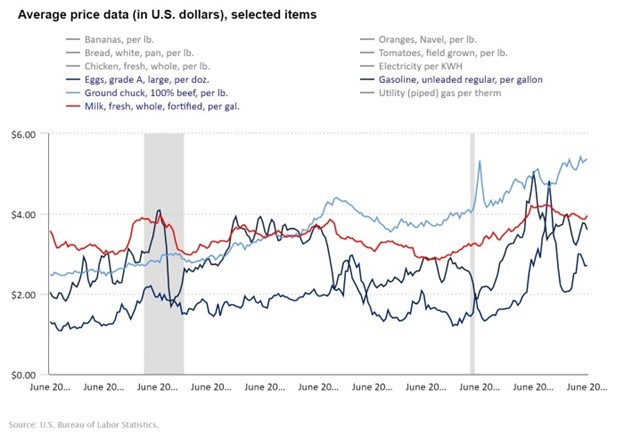June inflation numbers were released recently and good news! Prices didn’t just slow down in rising, but they fell month over month! Across the board, prices have increased by about 3% since this time a year ago. But if that’s the case, why does it feel that my grocery prices have almost doubled over the past few years? It certainly feels that I am paying more for less in my most recent trips to the grocery store.
According to the Federal Reserve Bank of St. Louis, grocery prices have risen only 1% over the past year. But when looking at data from 2021, food prices on average have increased almost 22% since January 20211. Despite that, gone are the days when someone could walk into a grocery store and buy a dozen eggs for $1.50 or a gallon of milk for under $3. Now, eggs can be somewhere between $3 – $5 (or more for higher-quality ones). Nearly every food group costs more than it did a year ago.
But what we consumers can feel as inflationary can come across as “shrinkflation” while typical inflation usually means paying more for the same product or service. Shrinkflation is the practice of reducing the size of a product while maintaining the same price and is another strategy engaged by companies in order to maintain profit margins in the face of rising costs (note that SP500 profit margins have doubled on average since 20002). Recently retailers such as Walmart and Pepsi have been accused of this practice. Walmart recently cut the number of sheets in its Great Value paper towel rolls from 168 to 120 but did not reduce the price. “In a report on shrinkflation, Sen. Bob Casey of Pennsylvania, called out Gatorade for swapping out a 32-ounce bottle for a 28-ounce version and keeping the same price.”3
In a Pew Research Center survey from May, 62% of U.S. adults said inflation was “a very big problem in the country today,” a higher percentage than any other issues they were asked about4. While financial media outlets may focus on the overall CPI number coming down, or the core CPI number (which does not include food and energy an area on which I feel I spend a significant amount of my disposable income), Americans are still feeling the heat from rising costs on some of the most essential items. Inflation may be cooling, but consumers’ outrage over higher prices is still running hot.
Sources:
- Food and Beverages | FRED | St. Louis Fed (stlouisfed.org)
- Guide to the Markets | J.P. Morgan Asset Management (jpmorgan.com)
- Article: Inflation: Walmart, Chipotle criticized over prices (cnbc.com)
- Americans’ Views of Economy Slip, Inflation Still Seen as Major Problem | Pew Research Center
Schneider Downs Wealth Management Advisors, LP (SDWMA) is a registered investment adviser with the U.S. Securities and Exchange Commission (SEC). SDWMA provides fee-based investment management services and financial planning services, along with fee-based retirement advisory and consulting services. Material discussed is meant for informational purposes only, and it is not to be construed as investment, tax or legal advice. Please note that individual situations can vary. Therefore, this information should be relied upon when coordinated with individual professional advice. Registration with the SEC does not imply any level of skill or training.
About Schneider Wealth Management
Schneider Downs Wealth Management has been providing investment and retirement services since 2000. Although our service platforms continue to evolve, commitment to our clients remains our first priority. Our service is tailored to your individualized goals but built on the fundamental principles of our practice: fiduciary guidance, fee transparency and goal-based decision making. To learn more, visit our dedicated Wealth Management page.





